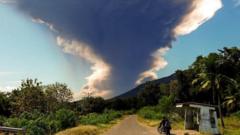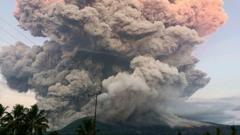An explosive eruption from Mount Lewotobi Laki-laki on Indonesia's Flores island launched an ash cloud about 11 miles into the atmosphere, marking a significant increase in volcanic activity.
Mount Lewotobi Laki-laki Eruption Sends Ash Plume into the Skies

Mount Lewotobi Laki-laki Eruption Sends Ash Plume into the Skies
A powerful volcanic eruption in Indonesia produces an ash cloud that soars 11 miles high, surpassing recent eruptions.
On July 7, 2025, Mount Lewotobi Laki-laki erupted dramatically, releasing an ash cloud that reached an impressive altitude of 11 miles. This eruption is noteworthy as it is nearly quadruple the height of the previous month’s plume, which was recorded at three miles high. The Indonesian national volcanic agency has confirmed that this eruption lasted around six minutes in the morning, with additional eruptions occurring throughout the day.
Previous activity at the volcano has raised concerns; last November, a separate eruption resulted in a cloud that was slightly over a mile high and tragically claimed the lives of at least 10 individuals. Currently, there are no reports of casualties from the latest eruption, although the volcanic alert level has been classified at its highest tier, indicating significant danger.
Geographically, Flores island is situated hundreds of miles away from the more frequented tourist destinations of Bali and Java. Comparatively, the ash plume emitted this week, while substantial, still falls short of an eruption from three years ago in Tonga, where an eruption produced an astonishing plume that reached 35 miles, surpassing the stratosphere.
As officials monitor the situation closely, the ongoing eruptions serve as a stark reminder of the power of nature and the urgent need for preparedness in volcanic regions.




















